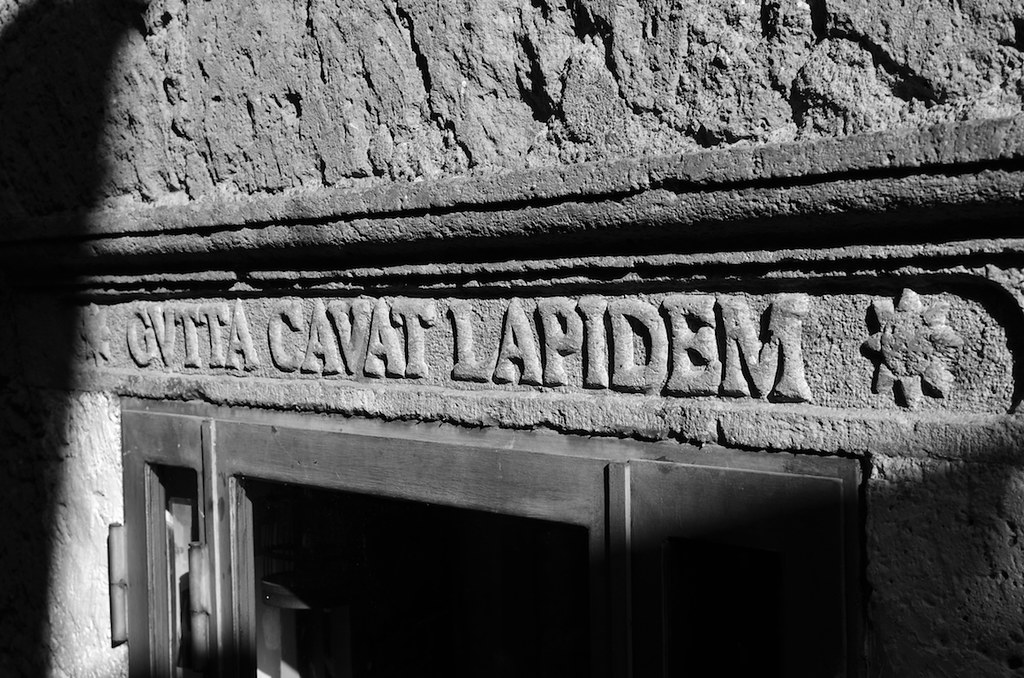
Gutta cavat lapidem Learn4Life
Gutta cavat lapidem (non vi, sed saepe cadendo). (Ovid). The water drop drills stone (not by the force, but by falling often). [The endurance can overcome the obstacle even without the force.";. Gutta cavat lapidem non vi, sed saepe cadendo. A drop drills the rock not with force but with perseverance. H Habeas corpus.

Następne 5 lat… Gutta cavat lapidem non vi sed saepe cadendo
Gutta cavat lapidem (non vi, sed saepe cadendo). (Ovid) The water drop drills stone (not by the force, but by falling often). Endurance can overcome an obstacle even without force. H; Hannibal ante portas! Hannibal is at the door! The enemy/danger is at the door!

Monika Novotná Gutta cavat lapidem non vi, sed saepe cadendo
Latin English Translation of "gutta cavat lapidem" into English Sample translated sentence: Gutta cavat lapidem non vi, sed saepe cadendo. ↔ Dripping water wears away a stone not with its strength, but with its constancy. gutta cavat lapidem + Add translation Latin-English dictionary constant dripping wears the stone

Narodowe lumbago Gutta cavat lapidem non vi sed saepe cadendo
Perhaps a loose calque of Ancient Greek πέτρην κοιλαίνει ῥανὶς ὕδατος ἐνδελεχείῃ (pétrēn koilaínei rhanìs húdatos endelekheíēi), a verse by fifth-century BCE poet Choerilus of Samos. Though the exact quoted words are first found in Ovid, the idea appears twice in Lucretius already: c. 99 BCE - 55 BCE, Lucretius, De rerum natura 4.1286-1287:

Gutta cavat lapidem non vi, sed saepe cadendo. Latino
List of Latin phrases (G) - Wikipedia List of Latin phrases (G) This page lists English translations of notable Latin phrases, such as veni vidi vici and et cetera. Some of the phrases are themselves translations of Greek phrases, as Greek rhetoric and literature reached its peak centuries before the rise of ancient Rome .

Tuskomatopulus Gutta cavat lapidem non vi sed saepe cadendo
Gutta cavat lapidem non vi, sed sæpe cadendo. The drop hollows out the stone not by strength, but by constant falling. Quoted in the Menagiana, 1713. Probably first to use it was Richard, Monk of S. Victor; Paris. (Died about 1172. Scotchman by birth.) In his Adnotationes mysticæ in Psalmos he says: "Quid lapide durius, quid aqua mollius?

Gutta cavat lapidem non vi sed saepe cadendo. 山下太郎のラテン語入門
Gutta cavat lapidem non vi, sed saepe cadendo. Sic addiscit homo non vi, sed saepe legendo. (… and so a man learns new things, not by force but by reading a lot) 4. Lucretius ( De rerum natura I, 313) once saw the devastating effect of a leaky gutter and wrote: Stillicidii casus lapidem cavat.

Pin on ESCRITURA
Explanations: Arabic Croatian tiha voda brege dere Explanations: Croatian Dutch Het water holt de zware steen English It is dogged does it dogged Explanations: Greek English Water dripping day by day wears the hardest rock away Explanations: Dutch, English English Little strokes fell great oaks Explanations: English English

Gutta cavat lapidem, non vi, sed saepe cadendo. A water drop hollows a
Evolutions are always preferable to revolutions and gutta cavat lapidem, non vi sed saepe cadendo. [The drop of water hollows out the stone by frequent falling.] We should persevere in doing many.

Gutta cavat lapidem, non vi sed saepe cadendo YouTube
Nel corso del Medioevo la sentenza fu ampliata da Alano da Matera nell'esametro gutta cavat lapidem non vi, sed saepe cadendo, cioè "la goccia perfora la pietra non con la forza, bensì con il continuo stillicidio", usando cioè la seconda parte come spiegazione della analogia introdotta dal proverbio. Variante

Gutta cavat lapidem Buongiorno
a water drop hollows a stone |not by force, but by falling often| is the translation of "gutta cavat lapidem |non vi sed saepe cadendo|" into English. Sample translated sentence: Gutta cavat lapidem non vi, sed saepe cadendo. ↔ Dripping water wears away a stone not with its strength, but with its constancy.

Gutta cavat lapidem Photo by Vinicio Meassi (DSC_2312r) Vinicio
"Gutta cavat lapidem, non vi, sed saepe cadendo." Similar proverbs are found elsewhere, though probably in a different sense. Thus in modern Greek, "The tongue has no bones, yet it breaks bones;" in Turkish, "The tongue has no bone, yet it crushes;" again, "One drop of honey," says the Turk, "catches more bees than a ton of vinegar."

Carmelo Nobile️️️️️️️️ Tattoos on Instagram “Gutta cavat lapidem non
De gustibus non est disputandum. That is a matter of taste. (N/A) Gutta cavat lapidem, non vi sed saepe cadendo. The drop excavates the stone, not with force but by falling often. (Ovid, Ex Ponto) Mendacem memorem esse oportet. A liar needs a good memory. (Quintilianus, De institutione oratoria) Faber est suae quisque fortunae.

(Gutta cavat lapidem, non vi sed saepe cadeno) "Steter Tropfen höhlt
Gutta cavat lapidem non vi sed saepe cadendo, the first part being written by Ovid (Pont. 4.10), and the second one added in medieval times ( according to WP) and recorded by Giordano Bruno in The Torchbearer.

Gutta cavat lapidem, non vi, sed saepe cadendo Tatuaggi
15. Gentleness and kindness overcome the most powerful and obstinate. long forbearing—or, "slowness to anger" (Pr 14:29; 15:18). Matthew Poole's Commentary By long forbearing, by patient submission and expectation, is a prince persuaded, or pacified, whereas his rage is increased by opposition.

Gutta cavat lapidem, non vi sed saepe cadendo. Translation “The drop
gutta cavat lapidem [non vi sed saepe cadendo] Phrase Meaning: a water drop hollows a stone [not by force, but by falling often] Comment main phrase is from Ovid, Epistulae ex Ponto IV, 10, 5.; [53] expanded in the Middle Ages Word-for-word analysis: